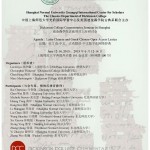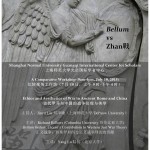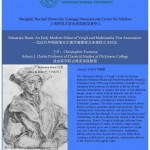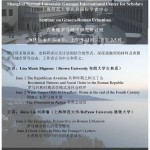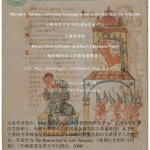Excitement is mounting for the coolest Ovid conference in a generation, or maybe ever, Globalizing Ovid: An International Conference in Commemoration of the Bimillennium of Ovid’s Death. Organized primarily by the indefatigable Jinyu Liu of DePauw University, the conference is jointly sponsored by the Chinese National Social Science Foundation, Shanghai Normal University, and Dickinson College. It will take place May 31–June 2, 2017, at Shanghai Normal. The large international cast of Ovidian luminaries includes John Miller and Allison Sharrock, as well as many wonderful Chinese Latinists. I am delighted to be giving the concluding address, of which the abstract follows. Abstracts of all the talks are available now via the conference website, linked above.
The impulses motivating the study and teaching of the classics have been alternately outwardly and inwardly directed. On the one hand, the classics promise effectiveness in the world, more informed public action through the cultivated powers of thought and expression. On the other hand, and at other times, the classics promise a kind of inner ennoblement, a purer refuge from the less desirable aspects of modernity. These fundamental aspects of studying the classics do not change as globalization occurs, or with the actual content of the canon or national tradition. What is changing, and quickly, is the size and the interconnectedness of the communities of classicism. The role of digital technology in these changes has been much discussed. The best uses of technology are those that create opportunities for the promise of classicism to flourish among people. It is a mistake to follow the apparent dictates of technology separately from the communities of actual people among whom it operates and which it serves. The best opportunities for serving, augmenting, and enriching the communities of global classicism lie in three areas. First, the creation of commentaries geared toward specific communities of readers (e.g., accessible commentaries on the Chinese classics in English, or commentaries on Greco-Roman texts by Chinese scholars for Chinese students) with a focus on close readings of key passages. Second, an approach to digitization that creatively rescues good pre-digital work in order to create broader access and better pedagogy—for example special dictionaries like Frieze’s Vergilian dictionary or Goncalves’ Lexicon Latino-Sinicum. Third, the creation of experiences and communities around the love of the classics, outside traditional academic venues. The Paideia Institute is the model here. The challenge is that none of these activities is sufficiently rewarded by the incentives of individuals in academic life. Yet the rewards of these approaches will be very real for all of us who love the classics.
